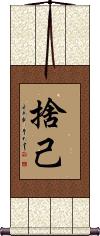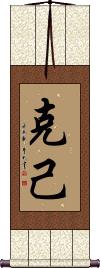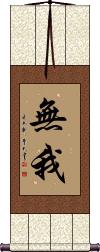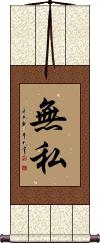Many custom options...
And formats...

Self Sacrifice in Chinese / Japanese...
Buy a Self Sacrifice calligraphy wall scroll here!
Personalize your custom “Self Sacrifice” project by clicking the button next to your favorite “Self Sacrifice” title below...
2. Self-Restraint / Self-Control
3. Selflessness
4. Unselfish: Perfectly Impartial
5. Impartial and Fair to the Brotherhood and Sisterhood of the World
Self Sacrifice
Self-Restraint / Self-Control
克己 can be translated as “self-denial,” “self-abnegation,” “self-restraint,” “self-discipline,” “self-mastery,” or selflessness.
As a tenet of Korean taekwondo, and other martial arts, this is often used with the title “self-control.”
Selflessness
無我 is a more common way to say selflessness in Japanese. This literally means “no self,” or a better translation might be “not thinking of oneself.” 無我 is also understood in Chinese and Korean. 無我 is a very old word in CJK languages.
無我 is the word a Buddhist would use to express the idea of selflessness or unselfishness. For Korean Buddhists, it can mean self-renunciation.
See Also: Altruism
Selflessness
無私 would be literally translated as “none self” in Chinese, Korean, and Japanese.
It is used to express “selflessness” or “unselfish.”
無私 is a popular term for the idea of being selfless or unselfish in modern China and Japan.
This term is not as commonly used in Korea but still has good meaning.
Unselfish: Perfectly Impartial
大公無私 is a Chinese proverb that comes from an old story from some time before 476 BC. About a man named Qi Huangyang, who was commissioned by the king to select the best person for a certain job in the Imperial Court.
Qi Huangyang selected his enemy for the job. The king was very confused by the selection, but Qi Huangyang explained that he was asked to find the best person for the job, not necessarily someone that he liked or had a friendship with.
Later, Confucius commented on how unselfish and impartial Qi Huangyang was by saying, “Da Gong Wu Si” which, if you look it up in a Chinese dictionary, is generally translated as “Unselfish” or “Just and Fair.”
If you translate each character, you'd have something like
“Big/Deep Justice Without Self.”
Direct translations like this leave out a lot of what the Chinese characters really say. Use your imagination, and suddenly you realize that “without self” means “without thinking about yourself in the decision” - together, these two words mean “unselfish.” The first two characters serve to drive the point home that we are talking about a concept that is similar to “blind justice.”
One of my Chinese-English dictionaries translates this simply as “just and fair.” So that is the short and simple version.
Note: This can be pronounced in Korean, but it's not a commonly used term.
See Also: Selflessness | Work Unselfishly for the Common Good | Altruism
Impartial and Fair to the Brotherhood and Sisterhood of the World
一視同仁 is how to write “universal benevolence.” This is also how to express the idea that you see all people the same.
If you are kind and charitable to everyone, this is the best way to state that virtue. It is the essence of being impartial to all mankind, regardless of social standing, background, race, sex, etc. You do not judge others, but instead, you see them eye to eye on the same level as you.
See Also: Benevolence | Compassion | Equality | Justice | Right Decision | Selflessness | Work Unselfishly for the Common
Work Unselfishly for the Common Good
克己奉公 is a Chinese proverb that is often used to express how one should act as a government official. Most of us wish our public officials would hold themselves to higher standards. I wish I could send this scroll, along with the meaning to every member of Congress, and the President (or if I was from the UK, all the members of Parliament, and the PM)
This can also mean: “Place Strict Standards on Oneself in Public Service.”
The story behind this ancient Chinese idiom:
Cai Zun was born in China a little over 2000 years ago. In 24 AD, he joined an uprising led by Liu Xiu, who later became the emperor of the Eastern Han Dynasty.
Later, the new emperor put Cai Zun in charge of the military court. Cai Zun exercised his power in strict accordance with military law, regardless of the offender's rank or background. He even ordered the execution of one of the emperor's close servants after the servant committed a serious crime.
Cai Zun led a simple life but put great demands on himself to do all things honorably. The emperor rewarded him for his honest character and honorable nature by promoting him to the rank of General and granting him the title of Marquis.
Whenever Cai Zun would receive an award, he would give credit to his men and share the reward with them.
Cai Zun was always praised by historians who found many examples of his selfless acts that served the public interest.
Sometime long ago in history, people began to refer to Cai Zun as “ke ji feng gong.”
See Also: Unselfish | Selflessness | Altruism
This in-stock artwork might be what you are looking for, and ships right away...
Gallery Price: $60.00
Your Price: $36.88
Gallery Price: $60.00
Your Price: $36.88
Gallery Price: $60.00
Your Price: $36.88
Not the results for self sacrifice that you were looking for?
Below are some entries from our dictionary that may match your self sacrifice search...
| Characters If shown, 2nd row is Simp. Chinese |
Pronunciation Romanization |
Simple Dictionary Definition |
捨己 舍己 see styles |
shě jǐ she3 ji3 she chi sutemi すてみ |
More info & calligraphy: Self Sacrifice(given name) Sutemi |
無量 无量 see styles |
wú liàng wu2 liang4 wu liang muryou / muryo むりょう |
More info & calligraphy: Immeasurable / Unlimited(adj-no,n) immeasurable; infinite; inestimable; (given name) Muryō apramāṇa; amita; ananta; immeasurable, unlimited, e.g. the 'four infinite' characteristics of a bodhisattva are 慈悲喜捨 kindness, pity, joy, and self-sacrifice. |
献身 see styles |
kenshin けんしん |
(n,vs,vi) devotion; dedication; self-sacrifice |
佛檀 see styles |
fó tán fo2 tan2 fo t`an fo tan butsudan |
buddha-dāna, Buddha-giving contrasted with Māra-giving; Buddha-charity as the motive of giving, or preaching, and of self-sacrifice, or self-immolation. |
十恩 see styles |
shí ēn shi2 en1 shih en jūon |
Ten kinds of the Buddha's grace: his (1) initial resolve to universalize (his salvation); (2) self-sacrifice (in previous lives); (3) complete altruism; (4) his descent into all the six states of existence for their salvation; (5) relief of the living from distress and mortality; (6) profound pity; (7) revelation of himself in human and glorified form; (8) teaching in accordance with the capacity of his hearers, first hīnayāna, then māhayāna doctrine; (9) revealing his nirvāṇa to stimulate his disciples; (10) pitying thought for all creatures, in that dying at 80 instead of at 100 he left twenty years of his own happiness to his disciples; and also the tripiṭaka for universal salvation. |
義氣 义气 see styles |
yì qì yi4 qi4 i ch`i i chi |
spirit of loyalty and self-sacrifice; code of brotherhood; also pr. [yi4 qi5] |
互裟伽藍 互裟伽蓝 see styles |
hù shā qié lán hu4 sha1 qie2 lan2 hu sha ch`ieh lan hu sha chieh lan Go Sagaran |
Haṃsa saṃghārāma, 'Wild goose monastery, ' on Mount Indraśailaguhā, whose inmates were once saved from starving by the self-sacrifice of a wild goose; also 僧裟伽藍 (or 僧鷹伽藍) . |
十種方便 十种方便 see styles |
shí zhǒng fāng biàn shi2 zhong3 fang1 bian4 shih chung fang pien jusshu hōben |
Ten kinds of suitable aids to religious success: almsgiving (or self-sacrifice); keeping the commandments; forbearance; zealous progress; meditation; wisdom; great kindness; great pity; awaking and stimulating others; preaching (or revolving) the never receding wheel of the Law. |
自己犠牲 see styles |
jikogisei / jikogise じこぎせい |
(noun - becomes adjective with の) (yoji) self-sacrifice; self-renunciation |
十八不共法 see styles |
shí bā bù gòng fǎ shi2 ba1 bu4 gong4 fa3 shih pa pu kung fa jūhachi fugū hō |
the eighteen distinctive characteristics as defined by Hīnayāna are his 十力, 四無畏, 三念住 and his 大悲; the Mahāyāna eighteen are perfection of body; of speech; of memory; impartiality or universality; ever in samādhi; entre self-abnegation; never diminishing will (to save); zeal; thought; wisdom; salvation; insight into salvation; deeds and mind accordant with wisdom; also his speech; also his mind; omniscience in regard to the past; also to the present; and to the future.; āveṇikadharma, or buddhadharma, the eighteen different characteristics of a Buddha as compared with bodhisattvas, i.e. his perfection of body (or person), mouth (or speech), memory, impartiality to all, serenity, self-sacrifice, unceasing desire to save, unfagging zeal therein unfailing thought thereto, wisdom in it, powers of deliverance, the principles of it, revealing perfect wisdom in deed, in word, in thought, perfect knowledge of past, future, and present, v. 智度論 26. |
克己 see styles |
kè jǐ ke4 ji3 k`o chi ko chi kokki こっき |
More info & calligraphy: Self-Restraint / Self-Control(n,vs,vi) self-control; self-mastery; self-restraint; self-denial; (given name) Yoshimi |
無我 无我 see styles |
wú wǒ wu2 wo3 wu wo muga むが |
More info & calligraphy: Selflessness(1) selflessness; self-effacement; self-renunciation; (2) {Buddh} anatta; anatman; doctrine that states that humans do not possess souls; (female given name) Muga anātman; nairātmya; no ego, no soul (of an independent and self-contained character), impersonal, no individual independent existence (of conscious or unconscious beings, anātmaka). The empirical ego is merely an aggregation of various elements, and with their disintegration it ceases to exist; therefore it has nm ultimate reality of its own, but the Nirvāṇa Sūtra asserts the reality of the ego in the transcendental realm. The non-Buddhist definition of ego is that it has permanent individuality 常一之體 and is independent or sovereign 有主宰之用. When applied to men it is 人我, when to things it is 法我. Cf. 常 11. |
無私 无私 see styles |
wú sī wu2 si1 wu ssu mushi むし |
More info & calligraphy: Selflessness(adj-no,adj-na,n) unselfish; selfless; disinterested |
克己奉公 see styles |
kè jǐ fèng gōng ke4 ji3 feng4 gong1 k`o chi feng kung ko chi feng kung |
More info & calligraphy: Work Unselfishly for the Common Good |
大公無私 大公无私 see styles |
dà gōng wú sī da4 gong1 wu2 si1 ta kung wu ssu |
More info & calligraphy: Unselfish: Perfectly Impartial |
見義勇為 见义勇为 see styles |
jiàn yì yǒng wéi jian4 yi4 yong3 wei2 chien i yung wei |
More info & calligraphy: Courage to do what is right |
剋己 克己 see styles |
kè jǐ ke4 ji3 k`o chi ko chi katsumi かつみ |
self-restraint; discipline; selflessness (personal name) Katsumi |
忘我 see styles |
wàng wǒ wang4 wo3 wang wo bouga / boga ぼうが |
selflessness; altruism (noun - becomes adjective with の) trance; ecstasy; enthusiasm |
没我 see styles |
botsuga ぼつが |
selflessness |
滅私 see styles |
messhi めっし |
selflessness; being unselfish |
義人 义人 see styles |
yì rén yi4 ren2 i jen gijin ぎじん |
righteous man selfless (pious, righteous) man; (given name) Yoshindo |
鐵面 铁面 see styles |
tiě miàn tie3 mian4 t`ieh mien tieh mien |
iron mask (as defensive armor); fig. upright and selfless person |
雷鋒 雷锋 see styles |
léi fēng lei2 feng1 lei feng |
Lei Feng (1940–1962), a soldier celebrated by the Chinese government from 1963 onward as a model of selflessness and devotion to the Communist Party |
二無我 二无我 see styles |
èr wú wǒ er4 wu2 wo3 erh wu wo ni muga |
The two categories of anātman: — 人無我 no (permanent) human ego, or soul; 法無我 no (permanent) individuality in or independence of self or of things. |
人無我 人无我 see styles |
rén wú wǒ ren2 wu2 wo3 jen wu wo nin muga |
Man as without ego or permanent soul; cf. 人我 and 二無我. Other similar terms are 衆生無我; 生空; 人空 and我空. |
人空觀 人空观 see styles |
rén kōng guān ren2 kong1 guan1 jen k`ung kuan jen kung kuan ningū kan |
The meditation on, or insight into the selflessness of person 人空. |
介之推 see styles |
jiè zhī tuī jie4 zhi1 tui1 chieh chih t`ui chieh chih tui |
Jie Zhitui (7th century BC), legendary selfless subject of Duke Wen of Jin 晉文公|晋文公[Jin4 Wen2 gong1], in whose honor the Qingming festival 清明[Qing1 ming2] (Pure brightness or tomb-sweeping festival) is said to have been initiated |
我無性 我无性 see styles |
wǒ wú xìng wo3 wu2 xing4 wo wu hsing ga mushō |
selflessness |
没我的 see styles |
botsugateki ぼつがてき |
(adjectival noun) self-effacing; selfless |
法念處 法念处 see styles |
fǎ niàn chù fa3 nian4 chu4 fa nien ch`u fa nien chu hō nenjo |
The position of insight into the truth that nothing has reality in itself; v. 四念處. |
Click here for more self sacrifice results from our dictionary
The following table may be helpful for those studying Chinese or Japanese...
| Title | Characters | Romaji (Romanized Japanese) | Various forms of Romanized Chinese | |
| Self Sacrifice | 捨己 舍己 | sutemi / suteki | shě jǐ / she3 ji3 / she ji / sheji | she chi / shechi |
| Self-Restraint Self-Control | 克己 / 剋己 克己 | kokki / koki | kè jǐ / ke4 ji3 / ke ji / keji | k`o chi / kochi / ko chi |
| Selflessness | 無我 无我 | muga | wú wǒ / wu2 wo3 / wu wo / wuwo | |
| Selflessness | 無私 无私 | mushi | wú sī / wu2 si1 / wu si / wusi | wu ssu / wussu |
| Unselfish: Perfectly Impartial | 大公無私 大公无私 | dà gōng wú sī da4 gong1 wu2 si1 da gong wu si dagongwusi | ta kung wu ssu takungwussu |
|
| Impartial and Fair to the Brotherhood and Sisterhood of the World | 一視同仁 一视同仁 | isshidoujin ishidojin | yí shì tóng rén yi2 shi4 tong2 ren2 yi shi tong ren yishitongren | i shih t`ung jen ishihtungjen i shih tung jen |
| Work Unselfishly for the Common Good | 克己奉公 | kè jǐ fèng gōng ke4 ji3 feng4 gong1 ke ji feng gong kejifenggong | k`o chi feng kung kochifengkung ko chi feng kung |
|
| In some entries above you will see that characters have different versions above and below a line. In these cases, the characters above the line are Traditional Chinese, while the ones below are Simplified Chinese. | ||||
Successful Chinese Character and Japanese Kanji calligraphy searches within the last few hours...













